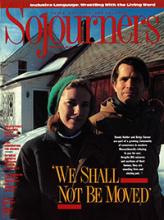DIAGNOSIS COMES AS SECOND nature to Walker Percy. Trained as a physician, Percy's own confinement as a tuberculosis patient during his medical internship was instrumental in his second career as a writer.
His first novel, The Moviegoer, follows the restless ponderings of a young stockbroker living in a suburb of New Orleans. The winner of the 1962 National Book Award, The Moviegoer (and Percy's novels to come) describes the spiritual malaise of the 20th century against the backdrop of the passing experience of the old South's mystery and manners.
A convert to Catholicism, Percy is a 20th-century writer serving witness to this century's intellectual life as well as its grim chapters of history.
Combining his avocation as a scholar of semiotics (the study of symbols) with his use of the novel form, Percy's work has continued to reflect his critique of scientific progress as it infiltrates into an increasingly homogenized, technologized popular culture.
Readers of Percy's novels can look forward to each story being characteristically rendered in a unique, ironic voice, filled with droll commentary as well as political, religious, and social allegory, and an unending search to name the age in which we live.
As an allegorist, Percy possesses such a penetrating sense of satire, social critic Robert Coles declared simply: "Walker Percy is a gift."
In Lost in the Cosmos, a 1984 collection of non-fiction essays, Percy takes on the conventional wisdom of the day -- a meld of media, New Age philosophy, and superficial scientism -- producing a thought-provoking and often hilarious antithesis to the euphemistic answers of the television age.
Read the Full Article

